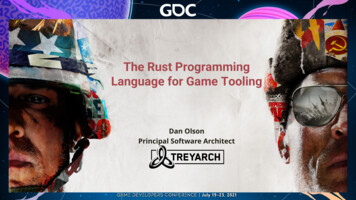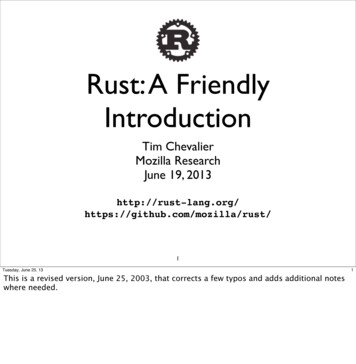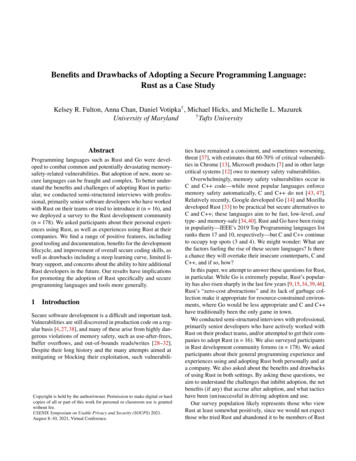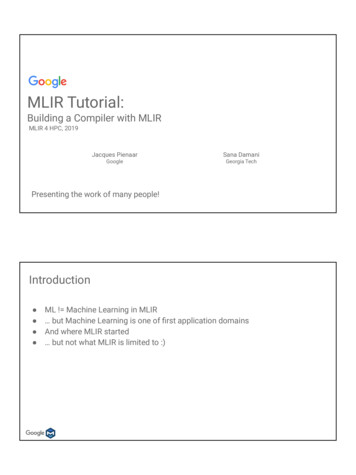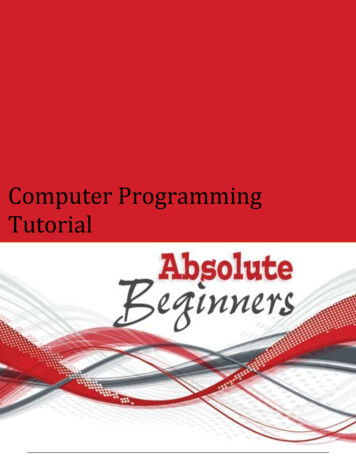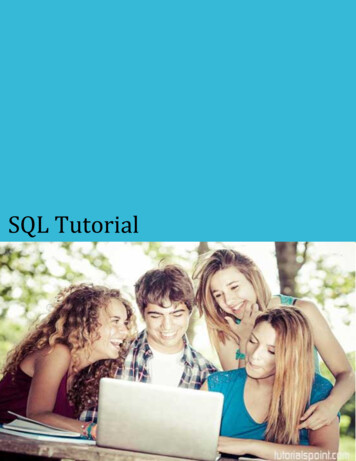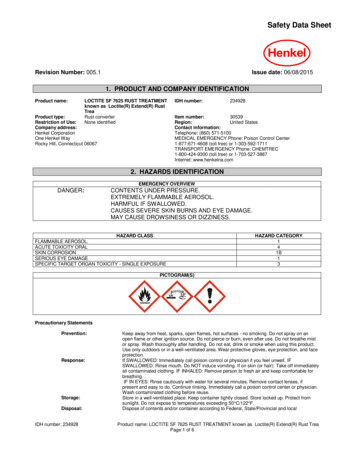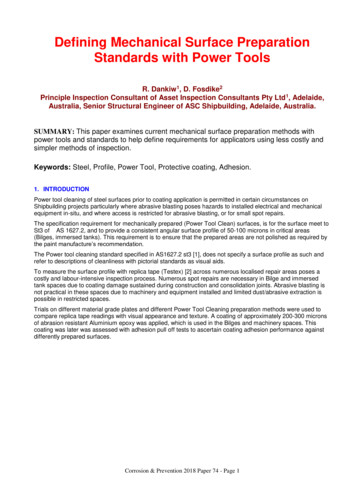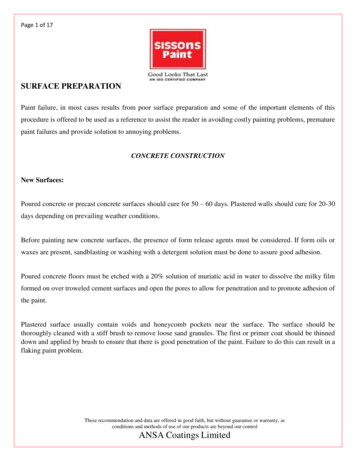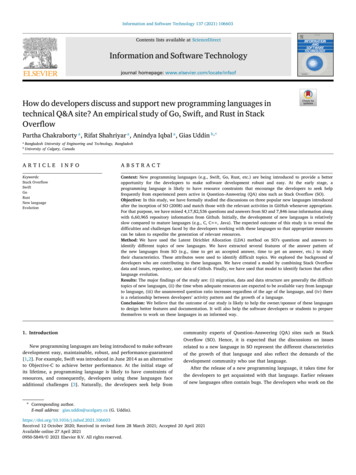
Transcription
RUSTi
RUSTAbout the TutorialRust is a modern systems programming language developed by the Mozilla Corporation.It is intended to be a language for highly concurrent and highly secure systems. It compilesto native code; hence, it is blazingly fast like C and C .This tutorial adopts a simple and practical approach to describe the concepts of Rustprogramming.AudienceThis tutorial has been prepared for beginners to help them understand the basic andadvanced concepts of Rust.PrerequisitesWe assume that the reader has an understanding of basic programming concepts isnecessary for this course.Copyright & Disclaimer Copyright 2019 by Tutorials Point (I) Pvt. Ltd.All the content and graphics published in this e-book are the property of Tutorials Point (I)Pvt. Ltd. The user of this e-book is prohibited to reuse, retain, copy, distribute or republishany contents or a part of contents of this e-book in any manner without written consentof the publisher.We strive to update the contents of our website and tutorials as timely and as precisely aspossible, however, the contents may contain inaccuracies or errors. Tutorials Point (I) Pvt.Ltd. provides no guarantee regarding the accuracy, timeliness or completeness of ourwebsite or its contents including this tutorial. If you discover any errors on our website orin this tutorial, please notify us at contact@tutorialspoint.comi
RUSTTable of ContentsAbout the Tutorial . iAudience . iPrerequisites . iCopyright & Disclaimer . iTable of Contents . ii1.RUST — Introduction . 1Application v/s Systems Programming Languages . 1Why Rust? . 12.RUST — Environment Setup . 3Installation on Windows . 3Installation on Linux / Mac. 5Using Tutorials Point Coding Ground for RUST . 53.RUST — HelloWorld Example . 6What is a macro? . 74.RUST — Data Types. 9Declare a Variable. 9Scalar Types. 10Integer . 10Float . 12Boolean . 13Character . 145.RUST — Variables . 15Rules for Naming a Variable . 15Syntax . 15Immutable. 15Mutable . 16ii
RUST6.RUST — Constant . 18Rust Constant Naming Convention. 18Constants v/s Variables. 18Shadowing of Variables and Constants. 197.RUST — String . 21String Literal . 21String Object . 22Illustration: new() . 24Illustration: to string() . 24Illustration: replace() . 24Illustration: as str() . 25Illustration: push() . 25Illustration: push str() . 26Illustration: len() . 26Illustration: trim() . 26Illustration:split whitespace(). 27Illustration: split() string. 28Illustration: chars() . 28Concatenation of Strings with operator . 29Illustration: Type Casting . 30Illustration: Format! Macro. 308.RUST — Operators . 31Arithmetic Operators. 31Relational Operators. 32Logical Operators . 34Bitwise Operators . 359.RUST — Decision Making . 38If Statement . 39iii
RUSTif else statement. 39Nested If. 41Match Statement. 4210. RUST — Loop . 44Definite Loop. 45Indefinite Loop . 46Continue Statement . 4811. RUST — Functions . 49Defining a Function. 49Invoking a Function . 50Returning Value from a Function . 51Function with Parameters. 5212. RUST — Tuple . 54Destructing. 5613. RUST — Array . 57Features of an Array . 57Declaring and Initializing Arrays . 57Passing Arrays as Parameters to Functions . 60Array Declaration and Constants. 6214. RUST — Ownership . 63Stack . 63What is Ownership? . 63Transferring Ownership . 63Ownership and Primitive Types. 6515. RUST — Borrowing. 66What is Borrowing? . 66Mutable References . 6716. RUST — Slices . 69iv
RUSTMutable Slices . 7017. RUST — Structure . 72Syntax: Declaring a structure . 72Syntax: Initializing a structure . 72Modifying a struct instance. 73Passing a struct to a function . 74Returning struct from a function . 75Method in Structure . 77Static Method in Structure . 7818. RUST — Enums. 80Illustration: Using an Enumeration . 80Struct and Enum . 81Option Enum . 82Match Statement and Enum . 83Match with Option . 84Match & Enum with Data Type . 8519. RUST — Modules . 87Illustration: Defining a Module. 88Use Keyword . 89Nested Modules . 89Illustration: Create a Library Crate and Consume in a Binary Crate . 9020. RUST — Collections . 94Vector . 94HashMap . 99HashSet . 10321. RUST — Error Handling . 109Panic Macro and Unrecoverable Errors . 109Result Enum and Recoverable Errors. 111v
RUSTunwrap() and expect() . 11322. RUST — Generic Types . 116Traits . 117Generic Functions. 11923. RUST — Input Output . 120Reader and Writer Types . 120Read Trait. 120Write Trait. 121CommandLine Arguments . 12324. RUST — File Input/ Output . 125Write to a File . 126Read from a File . 126Delete a file . 127Append data to a file . 127Copy a file . 12825. RUST — Package Manager . 129Illustration: Create a Binary Cargo project . 13026. RUST — Iterator and Closure . 134Iterators . 134Closure . 13727. RUST — Smart Pointers . 139Box . 13928. RUST — Concurrency . 143Threads . 143Join Handles . 144vi
1. RUST — IntroductionRUSTRust is a systems level programming language, developed by Graydon Hoare. Mozilla Labslater acquired the programme.Application v/s Systems Programming LanguagesApplication programming languages like Java/C# are used to build software, which provideservices to the user directly. They help us build business applications like spreadsheets,word processors, web applications or mobile applications.Systems programming languages like C/C are used to build software and softwareplatforms. They can be used to build operating systems, game engines, compilers, etc.These programming languages require a great degree of hardware interaction.Systems and application programming languages face two major problems: It is difficult to write secure code. It is difficult to write multi-threaded code.Why Rust?Rust focuses on three goals: Safety Speed ConcurrencyThe language was designed for developing highly reliable and fast software in a simpleway. Rust can be used to write high-level programs down to hardware-specific programs.PerformanceRust programming language does not have a Garbage Collector (GC) by design. Thisimproves the performance at runtime.Memory safety at compile timeSoftware built using Rust is safe from memory issues like dangling pointers, bufferoverruns and memory leaks.Multi-threaded applicationsRust’s ownership and memory safety rules provide concurrency without data races.1
RUSTSupport for Web Assembly (WASM)Web Assembly helps to execute high computation intensive algorithms in the browser, onembedded devices, or anywhere else. It runs at the speed of native code. Rust can becompiled to Web Assembly for fast, reliable execution.2
2. RUST — Environment SetupRUSTInstallation of Rust is made easy through rustup, a console-based tool for managing Rustversions and associated tools.Installation on WindowsLet us learn how to install RUST on Windows. Installation of Visual Studio 2013 or higher with C tools is mandatory to run theRust program on windows. First, download Visual Studio from here VS 2013Express. Download and install rustup tool for windows. rustup-init.exe is available fordownload here Rust Lang Double-click rustup-init.exe file. Upon clicking, the following screen will appear. Press enter for default installation. Once installation is completed, the followingscreen appears.3
RUST From the installation screen, it is clear that Rust related files are stored in the folder–C:\Users\{PC}\.cargo\binThe contents of the folder lldb.exerustc.exe // this is the compiler for rustrustdoc.exerustfmt.exerustup.exe cargo is the package manager for Rust. To verify if cargo is installed, execute thefollowing command:C:\Users\Admin cargo -Vcargo 1.29.0 (524a578d7 2018-08-05) The compiler for Rust is rustc. To verify the compiler version, execute the followingcommand:C:\Users\Admin rustc --versionrustc 1.29.0 (aa3ca1994 2018-09-11)4
RUSTInstallation on Linux / MacTo install rustup on Linux or macOS, open a terminal and enter the following command. curl https://sh.rustup.rs -sSf shThe command downloads a script and starts the installation of the rustup tool, whichinstalls the latest stable version of Rust. You might be prompted for your password. If theinstallation is successful, the following line will appear:Rust is installed now. Great!The installation script automatically adds Rust to your system PATH after your next login.To start using Rust right away instead of restarting your terminal, run the followingcommand in your shell to add Rust to your system PATH manually: source HOME/.cargo/envAlternatively, you can add the following line to your /.bash profile: export PATH " HOME/.cargo/bin: PATH"NOTE: When you try to compile a Rust program and get errors indicating that a linkercould not execute, that means a linker is not installed on your system and you will needto install one manually.Using Tutorials Point Coding Ground for RUSTA Read-Evaluate-Print Loop (REPL) is an easy to use interactive shell to compile andexecute computer programs. If you want to compile and execute Rust programs onlinewithin the browser, use Tutorialspoint Coding Ground.5
3. RUST — HelloWorld ExampleRUSTThis chapter explains the basic syntax of Rust language through a HelloWorld example. Create a HelloWorld-App folder and navigate to that folder on terminalC:\Users\Admin mkdir HelloWorld-AppC:\Users\Admin cd HelloWorld-AppC:\Users\Admin\HelloWorld-App To create a Rust file, execute the following command:C:\Users\Admin\HelloWorld-App notepad Hello.rsRust program files have an extension .rs. The above command creates an empty fileHello.rs and opens it in NOTEpad. Add the code given below to this file fnmain(){println!("Rust says Hello to TutorialsPoint !!");}The above program defines a function main fn main(). The fn keyword is used to define afunction. The main() is a predefined function that acts as an entry point to the program.println! is a predefined macro in Rust. It is used to print a string (here Hello) to the console.Macro calls are always marked with an exclamation mark – !. Compile the Hello.rs file using rustc.C:\Users\Admin\HelloWorld-App rustc Hello.rsUpon successful compilation of the program, an executable file (file name.exe) isgenerated. To verify if the .exe file is generated, execute the following command.C:\Users\Admin\HelloWorld-App dir//lists the files in folderHello.exeHello.pdbHello.rs6
RUST Execute the Hello.exe file and verify the output.What is a macro?Rust provides a powerful macro system that allows meta-programming. As you have seenin the previous example, macros look like functions, except that their name ends with abang(!), but instead of generating a function call, macros are expanded into source codethat gets compiled with the rest of the program. Therefore, they provide more runtimefeatures to a program unlike functions. Macros are an extended version of functions.Using the println! Macro - Syntaxprintln!(); // prints just a newlineprintln!("hello ");//prints helloprintln!("format {} arguments", "some"); //prints format some argumentsComments in RustComments are a way to improve the readability of a program. Comments can be used toinclude additional information about a program like author of the code, hints about afunction/ construct, etc. The compiler ignores comments.Rust supports the following types of comments Single-line comments ( // ) Any text between a // and the end of a line is treatedas a comment Multi-line comments (/* */) These comments may span multiple lines.Example//this is single line comment/* This is aMulti-line comment*/7
RUSTExecute onlineRust programs can be executed online through Tutorialspoint Coding Ground. Writethe HelloWorld program in the Editor tab and click Execute to view result.8
4. RUST — Data TypesRUSTThe Type System represents the different types of values supported by the language. TheType System checks validity of the supplied values, before they are stored or manipulatedby the program. This ensures that the code behaves as expected. The Type System furtherallows for richer code hinting and automated documentation too.Rust is a statically typed language. Every value in Rust is of a certain data type. Thecompiler can automatically infer data type of the variable based on the value assigned toit.Declare a VariableUse the let keyword to declare a variable.fn main() {let company string "TutorialsPoint"; // string typelet rating float 4.5;// float typelet is growing boolean true;// boolean typelet icon char ' '; //unicode character typeprintln!("company nameis:{}",company string);println!("company rating on 5 is:{}",rating float);println!("company is growingprintln!("company icon:{}",is growing boolean);is:{}",icon char);}In the above example, data type of the variables will be inferred from the values assignedto them. For example, Rust will assign string data type to the variable company string,float data type to rating float, et
Rust is a modern systems programming language developed by the Mozilla Corporation. It is intended to be a language for highly concurrent and highly secure systems. It compiles to native code; hence, it is blazingly fast like C and C . This tutorial adopts a simple and practical approach to describe the concepts of Rust programming. Audience
